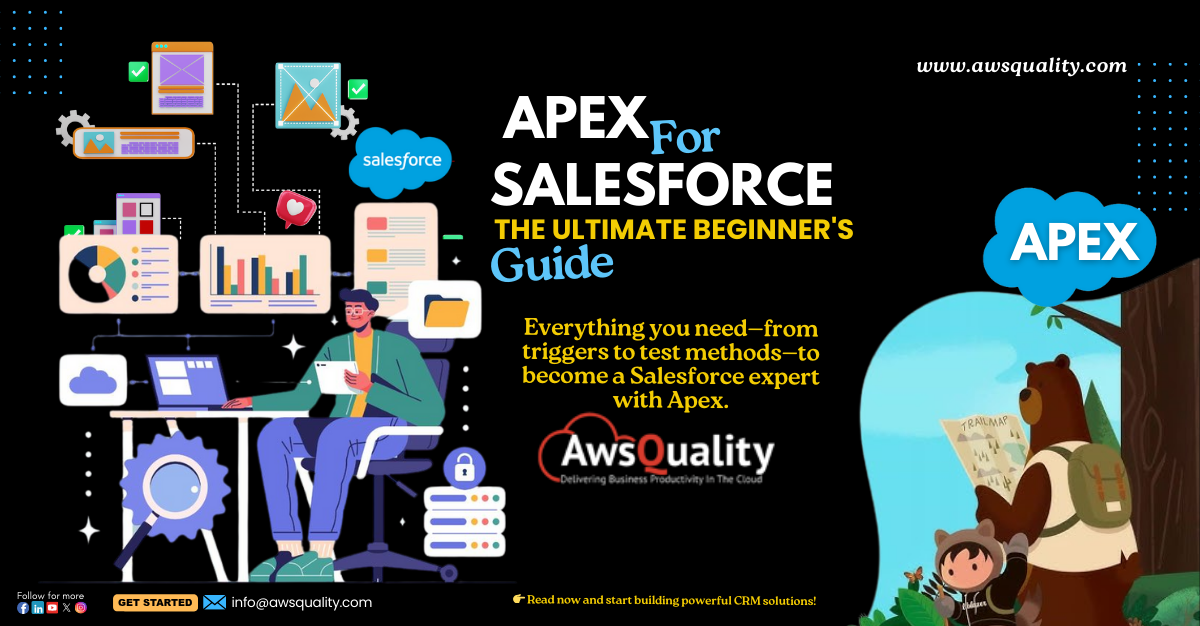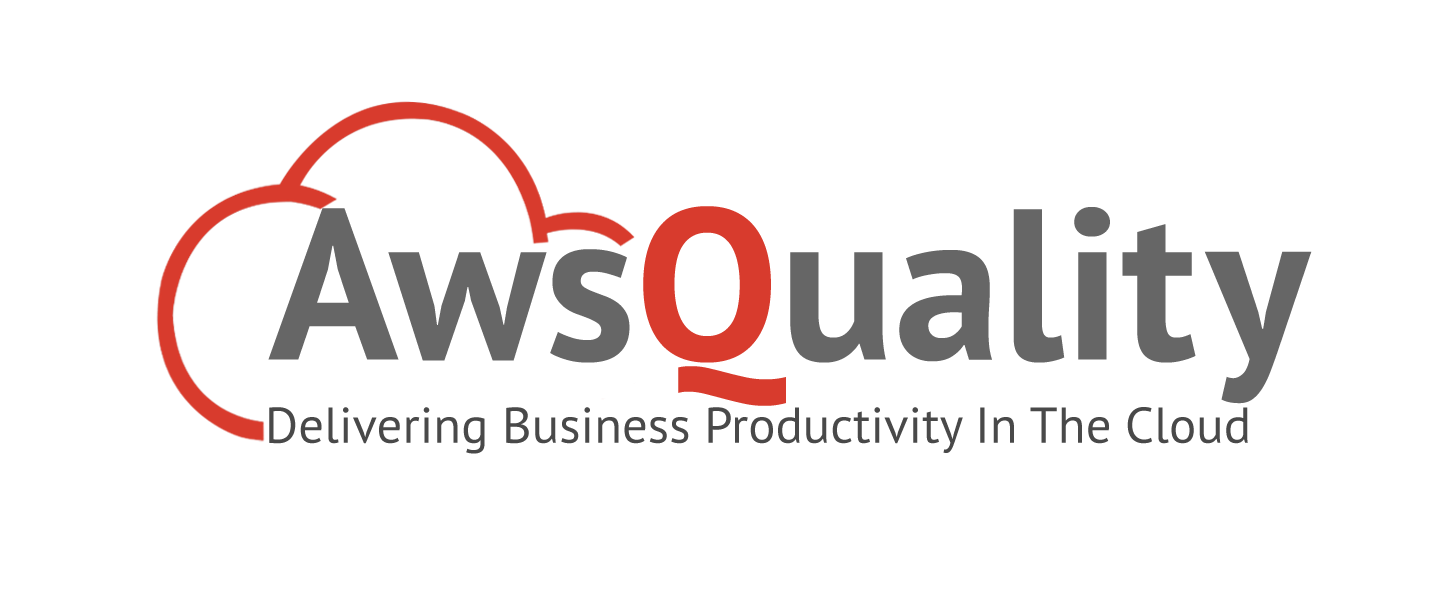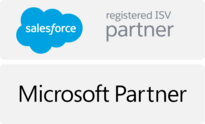
In today’s fast-paced digital world, Salesforce continues to dominate as the leading CRM platform—offering businesses the power of automation, scalability, and intelligent customer engagement. At the core of this capability lies Apex, Salesforce’s proprietary, object-oriented programming language that enables developers to write custom business logic, automate complex workflows, and build scalable applications directly on the Lightning Platform.
Whether you’re new to Salesforce development or a business leader looking to customize your CRM, learning Apex is your first step toward unlocking the full potential of Salesforce. This beginner-friendly guide, brought to you by AwsQuality—a trusted Salesforce Consulting Company and Implementation Partner—serves as your complete roadmap to mastering Apex Programming. From basic syntax and triggers to real-world use cases and advanced concepts, we break down everything you need to get started.
No matter where you’re located—in the UK, London, Germany, the USA, or Dubai—this guide empowers you with practical insights, coding examples, and expert tips to help you become a confident Salesforce developer.
What is Apex Programming in Salesforce?
Apex is a strongly-typed, object-oriented programming language tailored for Salesforce. It’s similar to Java and runs in the multi-tenant environment of Salesforce’s cloud platform. Apex enables developers to:
- Automate business processes using triggers and classes.
- Integrate with third-party systems using custom REST/SOAP APIs.
- Use SOQL and DML to effectively manage and work with Salesforce data.
Apex is core to any Salesforce customization, making it a must-know for professionals offering Salesforce professional services.
Basic Syntax of Apex Programming
Before diving into advanced development, here’s what you need to know as a beginner:
Variables & Data Types
String name = ‘AwsQuality’;
Integer count = 100;
Boolean isActive = true;
List<String> cities = new List<String>{‘London’, ‘Berlin’, ‘Dubai’};
Control Statements
if (count > 50) {
System.debug(‘High count’);
} else {
System.debug(‘Low count’);
}
Exception Handling
try {
// some code
} catch(Exception e) {
System.debug(‘Error: ‘ + e.getMessage());
}
SOQL Queries
List<Account> accList = [SELECT Name FROM Account WHERE Industry = ‘Technology’];
Apex Triggers, Classes, and Test Methods
Triggers
Triggers execute logic before or after DML operations:
trigger HelloWorldTrigger on Account (before insert) {
System.debug(‘Hello from trigger!’);
}
Classes
Organize reusable logic into classes:
public class AccountHelper {
public static void logAccounts(List<Account> accs) {
for(Account acc : accs) {
System.debug(acc.Name);
}
}
}
Test Methods
Salesforce requires 75%+ code coverage for deployment. Best practices:
- Use @isTest and @testSetup.
- Avoid SeeAllData=true.
@isTest
private class AccountTest {
@testSetup
static void setupData() {
Account a = new Account(Name=’Test Acc’);
insert a;
}
static testMethod void testLogic() {
// Add logic to test AccountHelper
}
}
Best Practices for Apex Beginners
If you’re new to Salesforce development, follow these:
- Bulkify Code – Avoid hitting governor limits by supporting bulk data operations.
- Avoid SOQL/DML in Loops – Cache data outside loops to enhance performance.
- Use Custom Metadata – Store configurable values.
- Secure Your Code – Respect object and field-level security.
Advanced Apex Use Cases
As your skills grow, you can tackle more complex requirements:
- Batch Apex – For large-scale data operations.
- Queueable Apex – For background and chaining tasks, use Queueable Apex.
- Scheduled Apex – Automate reports and data checks.
- REST API Creation – Integrate Salesforce with external systems.
- Dynamic Apex – Adapt your logic based on real-time metadata.
Asynchronous Apex Explained
Asynchronous processing allows you to offload time-consuming tasks:
- Future Methods: Lightweight background tasks, ideal for callouts.
- Queueable Apex: For background and chaining tasks.
- Batch Apex: Massive data processing in chunks.
- Scheduled Apex: Run jobs on a recurring schedule.
Free Apex Code Examples to Explore
Explore topics like:
- Account and Contact CRUD operations
- Trigger best practices
- Using custom settings and metadata
Top Resources from the Salesforce Developer Guide
- Apex Code Developer’s Guide
- Object Reference for Salesforce
- API Integration Documentation
- Security and Sharing Best Practices
- Lightning Component Developer’s Guide
These are essential reads for any Salesforce Consulting Partner in UK or globally.
Why AwsQuality for Salesforce Development?
AwsQuality is a Top Salesforce Consulting Company with a strong presence in India, UK, USA, Germany, and Dubai. Our services include:
- Salesforce Implementation Services
- Salesforce CRM Development
- Custom Apex Solutions
- Integration & Migration Services
- Free Salesforce Audits
Ratings:
- ⭐ Clutch: 4.9/5 Read Reviews
- ⭐ TrustPilot: 4.8/5 Read Reviews
- ⭐ Crunchbase Verified Profile
Contact: info@awsquality.com | Website: www.awsquality.com
FAQ: Apex Programming & Salesforce Development
Q1. What is Apex used for?
Customizing workflows, building triggers, integrating APIs, and automating logic.
Q2. What’s the best way to start learning Apex?
Begin with official resources like the Apex Developer Guide and tutorials from ApexHours.
Q3. How can AwsQuality help me?
In India, the UK, and other countries, we offer Salesforce consulting services. Additionally, you get a free Salesforce audit.
Q4. Is Apex hard to learn?
Knowing Java or any other object-oriented language makes it simpler.
Q5. Can I get sample Apex code?
Yes! Our experts will share use-case based code examples when you reach out.
Conclusion: Your Apex Journey Begins Here
Apex is the backbone of Salesforce customization, empowering businesses to automate complex workflows, build tailored solutions, and scale operations effectively. Whether you’re a startup in London or an enterprise in Germany, mastering Apex is a vital step toward unlocking the full potential of Salesforce CRM.
From understanding core concepts like syntax and object-oriented principles to implementing advanced features such as triggers, batch processing, and future methods, Apex enables you to craft powerful business logic. With best practices like bulkification and proper error handling, your Salesforce environment becomes more efficient and scalable.
AwsQuality Technologies—a trusted Salesforce Consulting Partner—brings over a decade of expertise in Apex development, CRM optimization, and digital transformation. Serving clients across the UK, Germany, USA, and Dubai, we help you develop robust Apex solutions, refactor legacy code, integrate third-party systems, and conduct free Salesforce audits to boost performance.
Learning Apex isn’t just about writing code—it’s about solving real business challenges. Ready to transform your Salesforce ecosystem? Partner with AwsQuality today.
👉 Visit: www.awsquality.com | 📧 info@awsquality.com
Let’s elevate your Salesforce success—together!




